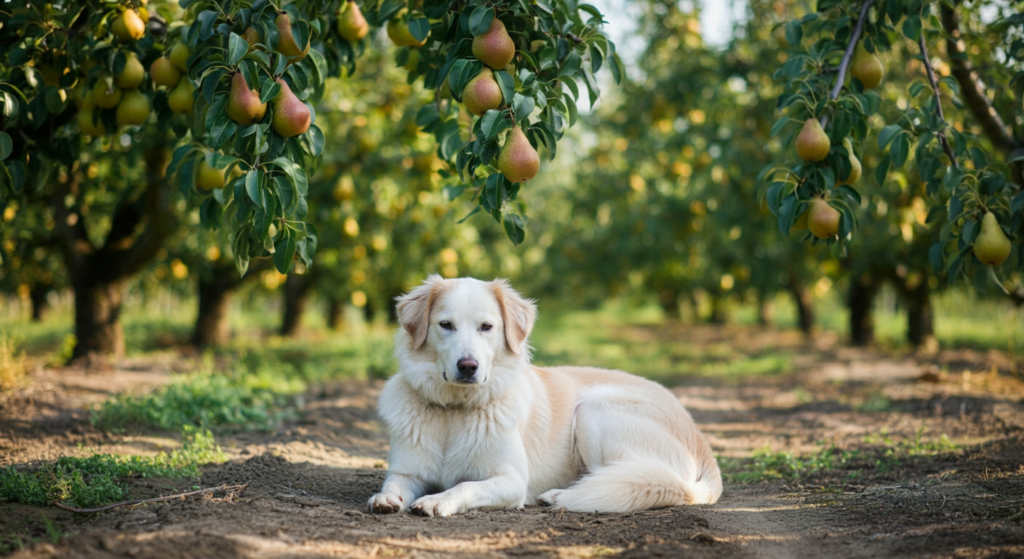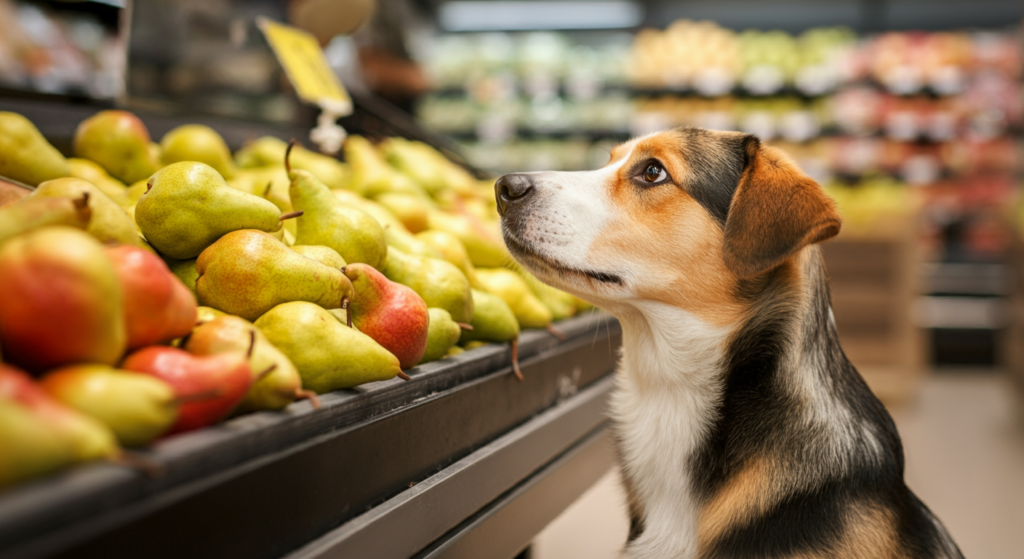Can dogs eat Pears?
Table of Contents
- Can Dogs Eat Pears? A Complete Guide to Safe Snacking for Your Pup
- FAQ: Pears and Dogs
- 1. Can dogs eat pears with skin?
- 2. What fruit can’t dogs eat?
- 3. How much pear can a dog eat?
- 4. Can dogs have Bartlett pears?
- 5. Can dogs eat pears UK?
- 6. Can dogs eat pears every day?
- 7. Can dogs eat pears from a tree?
- 8. Can dogs eat apples?
- 9. Can dogs eat pears skin?
- 10. Can dogs eat peaches?
- 11. Can dogs eat pears seeds?
- 12. What fruits can dogs not eat?
Can Dogs Eat Pears? A Complete Guide to Safe Snacking for Your Pup
As dog owners, we’re always on the lookout for safe and healthy treats for our furry companions. With so many human foods being off-limits for dogs, it’s natural to wonder about everyday items in our diets. Pears, a sweet and juicy fruit enjoyed worldwide, often prompt curiosity: “Can dogs eat pears?” They’re packed with nutrients for humans, but are they a safe snack for your dog? Knowing the answer can help you make informed decisions about sharing your food with your pet.
Yes, dogs can eat pears, but only under specific conditions. When served plain, fresh, and in moderation, pears are safe and can even provide health benefits for dogs. However, certain preparations and parts of the fruit—like the seeds—can pose risks. Let’s explore everything you need to know to make the best choice for your dog’s health.
What Are Pears?
Pears are a popular fruit cultivated worldwide, known for their sweet, juicy flesh and crisp texture. They come in various varieties, including Bartlett, Anjou, and Bosc, each with slightly different flavours and textures. Pears are rich in fibre, vitamins, and antioxidants, making them a nutritious choice for humans. But are they equally beneficial for dogs?
For dogs, fresh pears can be a safe treat, but processed pears, such as canned or syrup-soaked ones, often contain added sugars or preservatives that are harmful. Understanding these differences is crucial before sharing pears with your pet.
Can Dogs Eat Pears?
The simple answer is yes, dogs can eat pears, but moderation and preparation are key. Pears provide vitamins and fibre, which can support your dog’s overall health. However, precautions must be taken to ensure they’re served safely.
What about different types of pears? All fresh, plain pears are safe for dogs when prepared correctly. But avoid feeding your dog pear seeds, stems, or processed pear products.

What Are the Benefits of Pears for Dogs?
When served fresh and plain, pears can offer a range of health benefits for dogs. While they’re not essential to a dog’s diet, they can be a healthy occasional treat. Here are some potential benefits of pears for dogs:
- Rich in Fibre
Pears are an excellent source of dietary fibre, which supports healthy digestion and helps maintain regular bowel movements. Fibre can also promote a feeling of fullness, which may benefit dogs needing weight management. - Vitamins and Antioxidants
Pears contain essential vitamins, such as:
- Vitamin C: Supports immune function and reduces inflammation.
- Vitamin K: Aids in proper blood clotting and bone health. Pears also contain antioxidants that combat free radicals, promoting overall health and reducing oxidative stress.
- Low-Calorie Treat
Fresh pears are relatively low in calories, making them a guilt-free snack for dogs when given in moderation. This is particularly beneficial for dogs on calorie-controlled diets. - Hydration
With a high water content, pears can help keep your dog hydrated, especially on warm days. - Natural Energy Boost
The natural sugars in pears provide a quick energy boost, which may be helpful for active dogs during exercise or playtime.
Are Pears Bad for Dogs?
While pears are not toxic to dogs, there are risks associated with improper preparation or overconsumption. Pears should always be served in moderation, and certain parts of the fruit, such as the seeds, should be avoided.
What Are the Dangers of Dogs Eating Pears?
Although pears are generally safe, there are specific risks to be aware of. Here’s what to watch out for:
- Choking Hazard
Pears can pose a choking hazard, particularly for small dogs or if served in large pieces. Always cut pears into bite-sized chunks to prevent this risk. - Toxic Seeds
Pear seeds contain small amounts of cyanide, which is toxic to dogs (and humans). While the amount in a single seed is unlikely to harm a dog, ingestion of multiple seeds can be dangerous. Always remove seeds and the core before offering pears to your dog. - Digestive Upset
Too much pear can lead to digestive upset, such as diarrhoea or vomiting, especially in dogs not accustomed to eating fruit. - Sugar Content
Pears contain natural sugars, which can contribute to weight gain if fed in excess. Dogs with diabetes or obesity should only have pears in very small quantities or not at all. - Processed Pear Products
Avoid giving dogs canned pears, pear juice, or other processed pear products, as these often contain added sugars, preservatives, or artificial ingredients that can be harmful.
How Many Pears Can Dogs Eat?
Portion control is key when feeding pears to dogs. As a general rule:
- Small dogs: One or two small pieces of pear.
- Medium dogs: Three to four pieces.
- Large dogs: A few more pieces, but always in moderation.
Introduce pears gradually and monitor for any adverse reactions, such as stomach upset or allergic symptoms.
Fun Facts About Dogs and Pears
- Some dogs love the sweet, juicy taste of pears, while others may not be interested. If your dog enjoys pears, they can be a fun and healthy treat.
- Did you know that pears have been cultivated for over 3,000 years? While they’re a staple for humans, they’re still a novel snack for most dogs.

Conclusion
So, can dogs eat pears? The answer is yes—with precautions. Always serve fresh, plain, and seed-free pears in moderation. Avoid processed pears and monitor your dog for any unusual reactions. By following these guidelines, you can safely share this delicious fruit with your furry friend. Have you tried giving your dog pears? Share your experience below!
FAQ: Pears and Dogs
1. Can dogs eat pears with skin?
Yes, dogs can eat pears with the skin, as it contains fibre and nutrients. However, wash the pear thoroughly to remove any pesticides or chemicals, and ensure the pear is fresh and free of seeds before serving.
2. What fruit can’t dogs eat?
Dogs should avoid fruits like grapes, raisins, cherries, and unripe or green tomatoes, as these can be toxic. Always research specific fruits before offering them to your dog.
3. How much pear can a dog eat?
Portion control is key. Small dogs can have 1-2 small pieces, medium dogs 3-4 pieces, and large dogs a few more. Always serve pears in moderation to avoid digestive upset or excessive sugar intake.
4. Can dogs have Bartlett pears?
Yes, Bartlett pears are safe for dogs when served plain and fresh. As with other pear varieties, remove the seeds and core, and serve in small, manageable pieces.
5. Can dogs eat pears UK?
Yes, dogs in the UK can enjoy pears just like dogs elsewhere. The same rules apply—ensure the pears are fresh, plain, and free from seeds, stems, or any added sugar.
6. Can dogs eat pears every day?
No, pears should not be given to dogs daily. While they are a healthy treat, overconsumption can lead to digestive issues or weight gain due to their natural sugar content. Use them as an occasional snack.
7. Can dogs eat pears from a tree?
Dogs should not eat pears directly from a tree, as they might consume unripe fruit, stems, or seeds, which can be harmful. Always pick the fruit yourself, clean it, and prepare it properly before offering it to your dog.
8. Can dogs eat apples?
Yes, dogs can eat apples in moderation. Apples are a healthy snack rich in fibre and vitamins. However, remove the seeds and core, as the seeds contain small amounts of cyanide, which is toxic to dogs.
9. Can dogs eat pears skin?
Yes, the skin of a pear is safe for dogs and contains fibre. However, ensure it is washed thoroughly to remove any harmful chemicals or pesticides.
10. Can dogs eat peaches?
Yes, dogs can eat peaches in moderation. However, remove the pit, as it contains cyanide, which is toxic to dogs. Avoid canned peaches or those with added sugars.
11. Can dogs eat pears seeds?
No, dogs should not eat pear seeds. They contain trace amounts of cyanide, which can be harmful if ingested in large quantities. Always remove the seeds and core before giving pears to your dog.
12. What fruits can dogs not eat?
Dogs should avoid toxic fruits such as grapes, raisins, cherries, avocados, and unripe tomatoes. These can cause serious health issues ranging from kidney failure to gastrointestinal distress.
